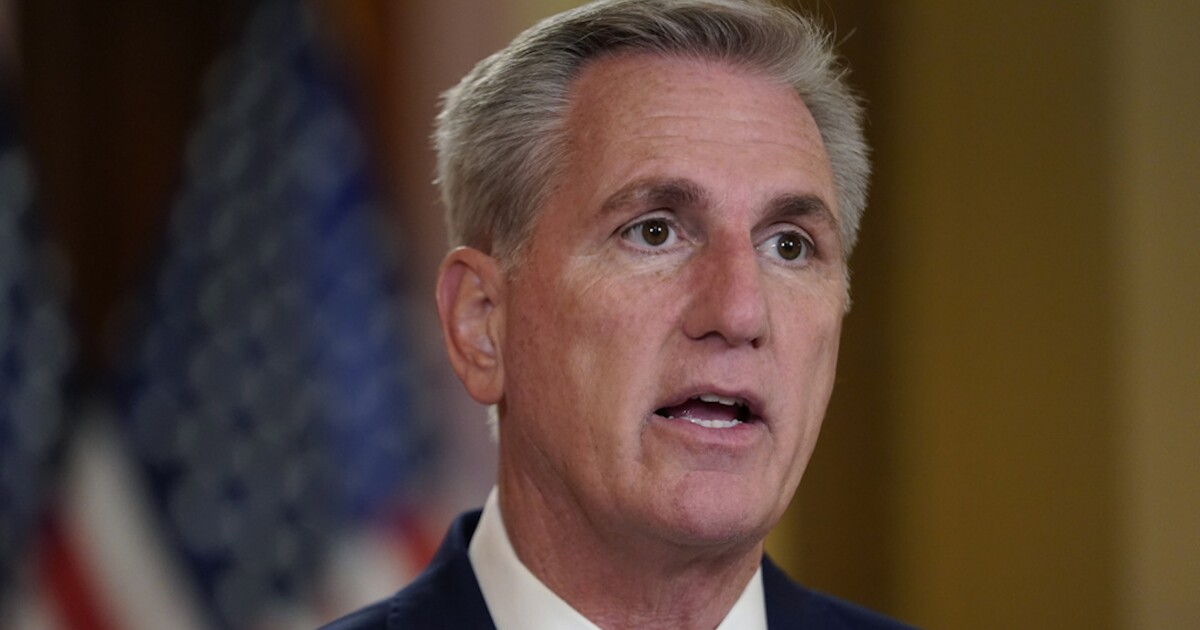

House Speaker Kevin McCarthy (R-CA) is aiming to bolster work requirements for major social welfare programs as part of his party’s plan to raise the debt ceiling, emphasizing a stance long seen as a policy and political winner by conservatives.
The proposal as it stands faces long odds, given Democrats’ control of the Senate and President Joe Biden’s insistence for a clean increase in the debt ceiling without accompanying conditions. Still, the legislation is an indication of the GOP’s priorities in what will likely be quite contentious negotiations in the coming weeks and months.
TAX DAY TO PROVIDE CLARITY ON TIMELINE FOR DEBT CEILING SHOWDOWN
McCarthy’s plan would require Medicaid beneficiaries to work 80 hours per month (20 hours per week), although there are exceptions for people with dependents, those over the age of 56, and others. More than 92 million people were enrolled in Medicaid as of December, the majority of whom were children, disabled, or elderly.
The proposal also targets the Supplemental Nutrition Assistance Program, known as food stamps, which already have some work requirements. Right now, those who are “capable” and aged 18-49 without dependents must report work. The new plan would increase the age limit to 56. Currently, those in the 18-49 cohort who can’t show they are employed at least 20 hours a week are limited to only three months of food stamps in a three-year period. The GOP debt limit plan would increase the number of people who fall into that group.
Matthew Gagnon is the CEO of the Maine Policy Institute, a conservative free market think tank that advocates work requirements for social welfare programs in Maine. Gagnon told the Washington Examiner that requiring work in exchange for assistance isn’t only a necessary step to incentivize work but also a crucial control on the cost overruns of a lot of welfare programs.
“It’s a common-sense reform, it’s something that has worked well when it’s been implemented,” he said.
The Congressional Budget Office estimated Tuesday that the reforms would, over the course of 10 years, reduce spending by $109 billion for Medicaid, $11 billion for SNAP, and $6 million for cash welfare.
Republicans appear to be looking for a repeat of the successes of the House Republican majority of the 1990s. Swept into unified control of Congress during the 1994 “Republican Revolution,” then-House Speaker Newt Gingrich (R-GA) pushed hard for the Personal Responsibility and Work Opportunity Reconciliation Act, which introduced major changes to welfare and was signed into law by Democratic President Bill Clinton.
The bill ended the existing cash welfare program, Aid to Families with Dependent Children, and created the Temporary Assistance for Needy Families program, which prioritized the need for adults to work in order to receive financial benefits from the government, gave states more autonomy over administering welfare, and included things such as a five-year lifetime cap on benefits.
Liberals strongly opposed the bill and warned it would have dire consequences. Still, the episode indicates that work requirements can have bipartisan support. The majority of Senate Democrats voted for the measures — including then-Sen. Joe Biden of Delaware.
“The culture of welfare must be replaced with the culture of work,” Biden said on the floor of the Senate ahead of his vote. “The culture of dependence must be replaced with the culture of self-sufficiency and personal responsibility.”
But the McCarthy plan to beef up work requirements is still a heavy lift.
Rep. David Scott (D-GA), the ranking member on the Agriculture Committee, which oversees SNAP, pushed back on McCarthy’s plan, calling the proposal as it currently stands a “non-starter.”
“The ransom note that Speaker McCarthy unveiled in front of a crowd of Wall Street bankers today is dead on arrival,” he said in a release. “Let me be perfectly clear: holding food assistance hostage for those who depend on it, including 15.3 million of our children, 5.8 million of our seniors, and 1.2 million of our veterans, in exchange for increasing the debt limit is a non-starter.”
Liberals have also taken aim at the proposal. The Center on Budget and Policy Priorities argues that more than 10 million people, including millions of children, would be at risk of losing at least some of their food stamp benefits should the plan go through.
“That includes about 6 million people who would potentially be newly subject to the time limit and at risk of losing SNAP, and about 4 million children who live in families that could have their SNAP benefits reduced, harming the entire household,” the group said.
The CBO said in its report that the food stamp requirements would push an average of 275,000 people a month off the rolls and lower monthly benefits for another 19,000. Currently, about 43 million people receive food stamps, according to the most recent figures, up from about 37 million before the pandemic struck.
But Jonathan Ingram, vice president of policy and research at the Foundation for Government Accountability, described McCarthy’s proposal as a “huge step in the right direction.” He said there are millions of able-bodied adults collecting welfare with no expectation of work.
“This would actually implement a work requirement nationwide for a good chunk of those able-bodied adults on Medicaid, extend it out to more able-bodied adults on food stamps, and ultimately get more folks off the sidelines, back into the workforce, boost the economy, and save taxpayer money,” Ingram told the Washington Examiner.
The CBO found that 15 million Medicaid recipients would be subject to the work requirements, though many could qualify for exemptions.
Gagnon said that Democrats, especially in recent years with the pandemic, have fought tooth and nail to expand programs like Medicaid and bolster the country’s unemployment cushion and many want to see those expansions become a permanent part of the government safety net.
“They are not, I think to the left side of the political spectrum, temporary fixes. [It’s] something that they would like to perpetuate long after COVID. That was sort of their opportunity, and I think that they are sticking with it,” Gagnon said. “So I would expect this to be a pretty hard line for them on the Left.”
Ingram also said that public opinion will favor stronger work requirements. He noted a recent election in the swing state of Wisconsin showed support for such guardrails.
Wisconsin Advisory Question 3 asked voters whether “able-bodied, childless adults [should] be required to look for work in order to receive taxpayer-funded welfare benefits.” An overwhelming 80% of voters said they did.
Many Republicans see reform to programs like TANF as a priority and a way to break the cycle of poverty for some recipients. During an interview last year, Rep. Adrian Smith (R-NE) told the Washington Examiner that he thought welfare reform could be an area that attracts bipartisan support.
CLICK HERE TO READ MORE FROM THE WASHINGTON EXAMINER
“I think we have too many programs that end up keeping people in poverty rather than having the expectation that these programs should be helping people out of poverty,” he said.
“This has to be part of the conversation,” said Ingram. “We’ve had work requirements for decades now for some able-bodied adults, they’ve been wildly successful, particularly at the state level, and so it has to be part of the conversation.”






